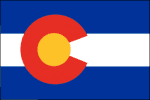Quick Legal Facts

Statewide Preemption:
Limited to traveling within the state in private transportation.
Concealed Carry:
Carrying a concealed knife in Colorado with a blade in excess of three-and-one-half inches (3½") in length is a violation of law.
Schools:
Deadly weapons may not be possessed on school grounds. This applies to all educational levels, kindergarten through post-graduate.
Major Cities with Knife Ordinances:
Denver, Boulder
Critical Dimensions:
Three-and-a-half inches.
At a Glance:
Any non-ballistic knife with a blade not exceeding 3 ½ inches is lawful to carry, whether concealed or openly, including on school grounds. A knife with a blade exceeding 3 ½ inches may not be carried concealed beyond one’s dwelling or on property under his control. Additional exceptions which allow concealed carry include at one’s place of business, in a private vehicle, and while hunting or fishing.
Relevant Statutes:
18-1-901. Definitions – defines “Deadly Weapon”
18-12-101. Definitions – peace officer affirmative defense – defines “Knife” and “Ballistic knife”
18–12–102. Possessing a dangerous or illegal weapon–affirmative defense—definition
18-12-105. Unlawfully carrying a concealed weapon–unlawful possession of weapons
18-12-105.5. Unlawfully carrying a weapon-unlawful possession of weapons–school, college, or university grounds
18-12-105.6. Limitation on local ordinances regarding firearms in private vehicles
Restricted Knives:
It is unlawful (class 5 felony) to knowingly possess a “ballistic knife.”
Concealed Carry:
It is a class 2 misdemeanor for a person to carry a concealed “knife” outside of one’s dwelling, one’s place of business, on property owned or under his control, or in a private vehicle. There is also a hunting and fishing exception, which is an affirmative defense.
Restrictions on Sale or Transfer:
None noted.
Restrictions on Carry in Specific Locations/Circumstances:
It is unlawful (class 6 felony) to possess a knife as defined in § 18-12-101 (blade longer than 3 ½ inches) on the property of any school, public or private, K through the university unless it remains in a locked vehicle. This also applies to any seminary.
Statewide Preemption:
Colorado law, § 18-12-105.6. Limitation on local ordinances regarding firearms in private vehicles provides that a weapon used for hunting or lawful protection may be carried in a vehicle statewide without violating inconsistent local ordinances. “Stops” are permitted.
Ordinances restricting knives exist in various Colorado municipalities, including Denver and Boulder.
Discussion:
Knife Defined
A “Knife” as defined by § 18-12-101 is:
any dagger, dirk, knife, or stiletto with a blade over three and one-half inches in length, or any other dangerous instrument capable of inflicting cutting, stabbing, or tearing wounds, but does not include a hunting or fishing knife carried for sports use. The issue that a knife is a hunting or fishing knife must be raised as an affirmative defense.
The definition places the burden on the individual in possession to establish that a given knife with a blade longer than 3 ½ inches is a “hunting or fishing” knife and is excluded from the classification.
Blade Length
Colorado law provides a judicially adopted rule, People v. Pickett, 571 P.2d 1078 (1977), that the length of a blade is the distance from the tip of the blade to the point where the blade meets the handle. This is consistent with the AKTI-recommended protocol for determining blade length.
Deadly Weapon Defined
“Deadly weapon” is defined by § 18-1-901. Definitions as follows:
“Deadly weapon” means:
(I) A firearm, whether loaded or unloaded; or
(II) A knife, bludgeon, or any other weapon, device, instrument, material, or substance, whether animate or inanimate, that, in the manner it is used or intended to be used, is capable of producing death or serious bodily injury.
The definition of “knife” in § 18-12-101, as discussed above, applies to§ 18-1-901 as well.
Concealment
The State of Colorado has not created a statutory definition for concealment. The judicially established test for a concealed “knife” is set forth in the standard criminal jury instruction, which provides:
“concealed” for purposes of section 18-12-105(1)(b) means placed out of sight so as not to be discernible or apparent by ordinary observation.
Whether a knife is concealed is typically an issue for the jury. This would include a pocket clip carry of a knife with a blade longer than 3 ½ inches. We do not recommend that one rely on pocket clip carry as being compliant with a concealed carry restriction.
Law Enforcement / Military
An exemption is provided in § 18-12-105, the concealed carry law, for law enforcement officers. A similar exemption is provided in § 18-12-105.5 regarding weapons on school grounds. This section also has an exemption for school “Resource Officers.”
Consequences
A Colorado Class 5 felony such as § 18–12–102, which includes possession of a ballistic knife, carries a sentence of one to three years imprisonment along and/or a fine in the range of $1,000 to $100,000.
A Class 6 felony, such as possession of a knife (blade longer than 3 ½ inches) on school grounds, is punishable by one year to 18 months imprisonment and /or a fine of $1,000 to $100,000.
Violations of the concealed carry statute are punishable as a Class 2 misdemeanor. The range of punishment includes three to 12 months in jail and/or a fine of $250 to $1,000.
Updated June 4, 2020, by Daniel C. Lawson